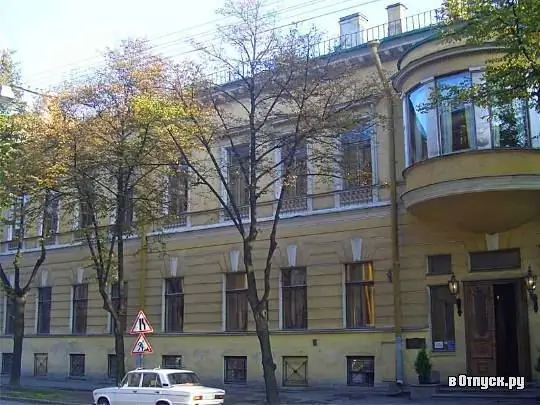
Description of the attraction
Not far from St. Isaac's Cathedral, in the very center of the city on the Neva, there is a mansion that once belonged to the chairman of the Russian Historical Society, Senator Polovtsov. For all the nondescript facade in the classical style, the mansion amazes with its luxurious interior decoration. An amazing decor made of precious wood and marble, inlaid parquet, molding has come down to us.
Where the mansion is today, a manor was originally located, which has changed many owners. So, during the reign of Catherine II, the estate was owned by the Levashev brothers, who were close to the empress's court. Since the brothers often traveled, the Empress used the house as she saw fit. Ekaterina Dashkova, Catherine's friend, was in the estate for some time. In addition, Francisco Miranda, the future king of France Charles X, stayed here. At various times, the estate was owned by Adjutant General Shuvalov, Ekaterina Pashkova, Nadezhda Tolstaya. In the end, Prince Sergei Gagarin bought the estate in 1835 and decided to remodel it by building a front wing on the side of Bolshaya Morskaya Street. For the construction of the wing, the prince invited A. Pel, a student of Auguste Montferrand, the author of the project of St. Isaac's Cathedral.
The son of the prince sold the house to Nadezhda Mikhailovna Polovtsova in 1864, but the construction and alteration of the decoration of the mansion continued after the sale. The mansion was rebuilt for a rather long time and did not spare money during the finishing. White marble used in the decoration of the premises was brought from Italy. All works were supervised by N. F. Brullo, architect, nephew of the artist Karl Bryullov. I also helped in the work of I. P. Ropeta, who changed the layout inside the mansion, improved the heating, plumbing, and sewerage systems.
Thanks to the efforts of Brullo, the unique interior of the magnificent Oak Hall was born, conceived and created in the style of the Renaissance. At the time, the Oak Hall was a library. Built-in bookcases, carved from wood, were brought from the same Italy, as well as different types of marble (from different provinces) - for the fireplace made by Florentine craftsmen.
Meetings of the Russian Historical Society, headed by A. Polovtsov, were usually held within the walls of the Oak Hall. Many historical collections were published with the direct participation of the Historical Society, and besides this, two and a half dozen volumes, which have not lost their significance today, "Russian Bibliographic Dictionary".
Maximilian Mesmacher took over the management of the work after N. Brullo died. Mesmacher completed the construction of the staircase of the main entrance, as well as the completely extraordinary White Hall, the floor of which was decorated with magnificent parquetry, recruited from more than thirty valuable varieties of wood. The Bronze Hall belongs to Mesmacher. Alexander, the son of the Polovtsovs, married in 1890, and the grand opening of the White Hall was timed to coincide with this event. Emperor Alexander III himself was a planted father at Polovtsov's wedding. Polovtsov's contemporaries often called the magnificent White Hall "the elegant hall of Louis XV", since in luxury it was in no way inferior to the interiors of the palaces of the French emperors.
In the 13th year of the last century, the mansion passed into the possession of the Polovtsovs' daughter, Anna Alexandrovna Obolenskaya. And in the 15th year Anna Aleksandrovna sells it for half a million L. P. Moshkevich. A year later, in 1916, the house became the property of K. I. Yaroshinsky. In October of the same year, an evening with poetry reading took place in the mansion, during which Sergei Yesenin and Nikolai Klyuev performed.
After the revolution, the building of the mansion was first given to the school of the trade union movement, and then, in 1934, it went to the Union of Architects. It was from this time that the Polovtsov mansion was also called the House of Architects.
In our time, the Polovtsov mansion houses the St. Petersburg branch of the Union of Architects of Russia. And the unique interiors received museum status and became available for visiting.






